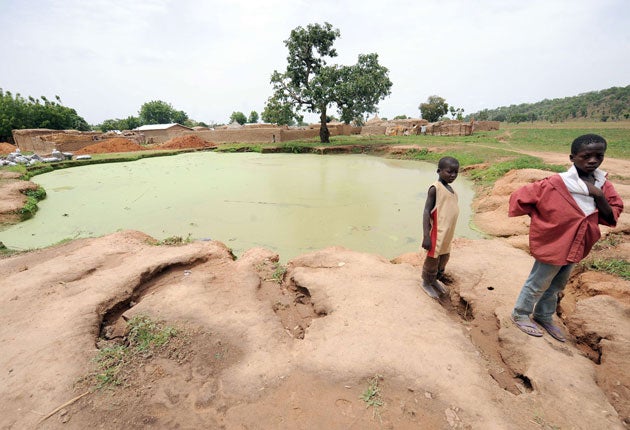Gold rush brings wealth but kills 400 children in Nigeria
The potential riches from mining are tempting, but the lead pollution it creates is killing communities

Ibrahim Bello says extracting gold from the ground can earn him $23 (£15) in two hours – more than subsistence farmers hereabouts make in two months. Such are the sums to be made in northern Nigeria's "gold rush", with impoverished farmers digging up rocks by hand in open mines – but many are in denial about its devastating consequences.
At least 400 children have died from poisoning caused by illegal gold mining since March because the ore being unearthed around their villages contains high concentrations of lead, contaminating the air, soil and water.
International agencies including the UN, Médecins Sans Frontières (MSF), the World Health Organisation (WHO) and the US Centers for Disease Control and Prevention have been working for months to try to contain the pollution. But heavy rains have spread the contamination, and the reluctance of villagers to admit that their new-found source of wealth is to blame has slowed the work. Aid agencies said in June that at least six villages in Zamfara state had been affected and around 170 children, mostly under five, killed. More contaminated communities have been discovered since then and the infant death toll has more than doubled.
"The reluctance of communities to disclose lead-related illnesses or deaths, and where they conduct mining, is seriously hampering our efforts to identify communities at risk," said John Keith, a technical adviser with the Blacksmith Institute, a New York-based anti-pollution consultancy.
Residents fear that disclosing the problem will lead the government to clamp down on their mining, which often brings the contaminated ore into direct contact with children. The men carry the ore back from the open mines for their wives to crush into a powder, using a hammer or stone. They then flush it with water to remove the sand and retain gold traces. Close to them, in family compounds, children play barefoot, exposed to the contaminated water and inhaling dust.
Symptoms of lead poisoning are particularly acute in children under five, damaging their nervous systems and kidneys and causing convulsions which can quickly lead to death. "When it affects a child, you will see he will begin shaking and vibrating. Before daybreak, the child could die," said Saminu Mohammed, a resident in Bagega, one of the affected villages.
Zamfara's poor rural communities are no strangers to illness, with regular outbreaks of cholera, meningitis and malaria. But few residents have received much formal education and science is often treated with scepticism. "Communities deny such deaths or attribute them to spirits and other beliefs," said the MSF co-ordinator in Zamfara, El Shafi'i Muhammad Ahmad.
It is not the first time Western medicine has clashed with deep religious and traditional beliefs in northern Nigeria. Zamfara was one of three states to suspend a polio immunisation programme led by the WHO in 2003 because some Muslim leaders said the oral vaccine was a Western plot to spread Aids and cause infertility.
The lead poisoning outbreak initially went unreported, with the high infant mortality rate thought to have been caused by cerebral malaria, which can trigger similar symptoms, such as convulsions, in small children. It was only when an MSF team testing for meningitis found high levels of heavy metal in the villagers' blood that the true cause was discovered.
MSF has been treating hundreds of children at clinics set up in towns, but Zamfara state's health ministry has identified as many as 180 remote communities where children may have been poisoned.
Join our commenting forum
Join thought-provoking conversations, follow other Independent readers and see their replies
Comments